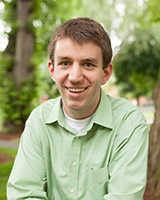
Even at a very young age, I was fairly inquisitive and tended to think in an abstract, philosophical way.
For example, I remember worrying about whether God’s foreknowledge made it impossible for humans to have free will, without knowing that many philosophers had struggled with the problem of divine foreknowledge for centuries.
In high school, I developed a great love for the humanities, thanks in part to some incredible English and history teachers. One of my history teachers, Mr. Gladden, inspired me to start reading some of the classics of Western civilization, such as Adam Smith’s The Wealth of Nations and Voltaire’s Candide. Once I was aware that some of these books addressed questions that had bothered and fascinated me since I was young, my decision to apply for the UScholars program was a no-brainer.
Most of the texts that I read in the UScholars program were challenging and interesting, but there are two that stand out.
The first is René Descartes’ Meditations on First Philosophy. As a philosophy major, I find the text fascinating because it addresses a lot of important questions about how we should do philosophy. It deals with the nature of knowledge and attempts to address skeptical worries about whether we really can know much of anything, or at least anything interesting (such as whether there really is an external world).
Although I am fairly skeptical of some of Descartes’ answers, I am quite sure I will continue reading and reflecting on his work for years to come.
The second text, also written by a philosopher, is Philip Kitcher’s Living With Darwin. The author doesn’t claim that Darwin’s theory of evolution, by itself, is enough to provide grounds for doubting the existence of the God of theism. But he does think that, when coupled with some philosophical concerns, Darwin’s theory provides good reason for not believing in God.
The text was challenging for me because I have at many times doubted whether God really exists, and I found some of Kitcher’s arguments to be pretty strong. The book really motivated me to start thinking seriously again about arguments for and against God’s existence, and it helped prepare me for "Existence of God," my capstone philosophy course with Dr. Layman. Dr. Layman did an excellent job of discussing the arguments and even addressing many of the concerns that Kitcher raised.
This program has challenged my faith by providing me with opportunities to continue exploring the doubts I have had about Christianity since I was young. However, these opportunities have often encouraged and informed my faith as well. Just being around other students and professors who are professing Christians and who still have doubts has encouraged me that having doubts does not necessarily threaten my Christian identity.
I will be attending law school next fall at the University of Pennsylvania. I hope to also get a PhD in philosophy. My ultimate goal is to become a professor of law and philosophy.